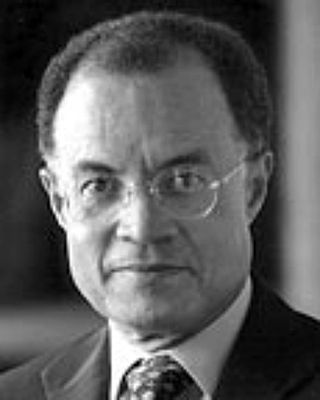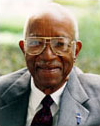Related Research Articles

Amherst College is a private liberal arts college in Amherst,Massachusetts. Founded in 1821 as an attempt to relocate Williams College by its then-president Zephaniah Swift Moore,Amherst is the third oldest institution of higher education in Massachusetts. The institution was named after the town,which in turn had been named after Jeffery,Lord Amherst,Commander-in-Chief of British forces of North America during the French and Indian War. Originally established as a men's college,Amherst became coeducational in 1975.

Timothy Dwight V was an American academic,educator,Congregational minister,and President of Yale University (1886–1898). During his years as the school's president,Yale's schools first organized as a university. His grandfather was Timothy Dwight IV,who served as President of Yale College ninety years before his grandson's tenure.
William Julius Wilson is an American sociologist,a professor at Harvard University,and an author of works on urban sociology,race,and class issues. Laureate of the National Medal of Science,he served as the 80th President of the American Sociological Association,was a member of numerous national boards and commissions. He identified the importance of neighborhood effects and demonstrated how limited employment opportunities and weakened institutional resources exacerbated poverty within American inner-city neighborhoods.

The Hotchkiss School is a coeducational preparatory school in Lakeville,Connecticut,United States. Hotchkiss is a member of the Eight Schools Association and Ten Schools Admissions Organization. It is also a former member of the G30 Schools group.

Baruch Samuel Blumberg,known as Barry Blumberg,was an American physician,geneticist,and co-recipient of the 1976 Nobel Prize in Physiology or Medicine,for his work on the hepatitis B virus while an investigator at the NIH and at the Fox Chase Cancer Center. He was president of the American Philosophical Society from 2005 until his death.

Alphonso Taft was an American jurist,diplomat,politician,Attorney General and Secretary of War under President Ulysses S. Grant. He was also the founder of the Taft political dynasty,and father of President and Chief Justice William Howard Taft.

James Hadley Billington was an American academic and author who taught history at Harvard and Princeton before serving for 42 years as CEO of four federal cultural institutions. He served as the 13th Librarian of Congress after being nominated by President Ronald Reagan in 1987,and his appointment was approved unanimously by the U.S. Senate. He retired as Librarian on September 30,2015.
Stanley King was the eleventh president of Amherst College. He held that position from 1932 to 1946.

Leszek Kołakowski was a Polish philosopher and historian of ideas. He is best known for his critical analyses of Marxist thought,such as in his three-volume history of Marxist philosophy Main Currents of Marxism (1976). In his later work,Kołakowski increasingly focused on religious questions. In his 1986 Jefferson Lecture,he asserted that "we learn history not in order to know how to behave or how to succeed,but to know who we are".
The John W. Kluge Center at the Library of Congress invites and welcomes scholars to the Library of Congress to conduct research and interact with policymakers and the public. It also manages the Kluge Scholars' Council and administers the Kluge Prize at the Library of Congress.
The Kluge Scholars Council is a body of distinguished scholars,convened by the Librarian of Congress to advise on matters related to scholarship at the Library,with special attention to the John W. Kluge Center and the Kluge Prize. Through discussion and reflection,the Council assists in implementing an American tradition linking the activities of thinkers and doers,those who are engaged in the world of ideas with those engaged in the world of affairs.

Drew Saunders Days III was an American legal scholar who served as Solicitor General of the United States from 1993 to 1996 under President Bill Clinton. He also served as the first African American Assistant Attorney General for the Civil Rights Division in the Carter Administration from 1977 to 1980. He was the Alfred M. Rankin Professor of Law at Yale Law School,assuming that post in 1992,and joining the Yale Law faculty in 1981. From 1997 to 2011,he headed the Supreme Court and appellate practice at Morrison &Foerster LLP and was of counsel at the firm's Washington,D.C. office until his retirement from the firm in December,2011. He earned his Juris Doctor degree at Yale Law School in 1966. He was admitted to practice law before the United States Supreme Court,and in the states of Illinois and New York.

The decolonisation of Africa is a process that largely took place from mid-1950s to 1975 during the Cold War,with radical government changes on the continent as colonial governments made the transition to independent states. The process was often marred with violence,political turmoil,widespread unrest,and organised revolts in both northern and sub-Saharan countries including the Mau Mau rebellion in British Kenya,the Algerian War in French Algeria,the Congo Crisis in the Belgian Congo,the Angolan War of Independence in Portuguese Angola,the Zanzibar Revolution in the Sultanate of Zanzibar,and the Nigerian Civil War in the secessionist state of Biafra.

William Shield McFeely was an American historian known for his Pulitzer Prize-winning 1981 biography of Ulysses S. Grant,as well as his contributions to a reevaluation of the Reconstruction era,and for advancing the field of African-American history. He retired as the Abraham Baldwin Professor of the Humanities emeritus at the University of Georgia in 1997,and was affiliated with Harvard University since 2006.

John Hope Franklin was an American historian of the United States and former president of Phi Beta Kappa,the Organization of American Historians,the American Historical Association,and the Southern Historical Association. Franklin is best known for his work From Slavery to Freedom,first published in 1947,and continually updated. More than three million copies have been sold. In 1995,he was awarded the Presidential Medal of Freedom,the nation's highest civilian honor.
Merwin Crawford Young was an American political scientist and professor at the University of Wisconsin–Madison.

Francis Mading Deng is a politician and diplomat from South Sudan who served as the newly independent country's first ambassador to the United Nations from 2012 to July 2016.
William Roger Louis CBE FBA,commonly known as Wm. Roger Louis or,informally,Roger Louis,is an American historian and a professor at the University of Texas at Austin. Louis is the editor-in-chief of The Oxford History of the British Empire,a former president of the American Historical Association (AHA),a former chairman of the U.S. Department of State's Historical Advisory Committee,and a founding director of the AHA's National History Center in Washington,D. C.
British Studies,officially the Faculty Seminar on British Studies is a weekly seminar at the University of Texas at Austin that has met continually since 1975. British Studies is directed by Wm. Roger Louis,a founding member of the seminar and a distinguished historian at the University of Texas. The seminar is sponsored by the British Studies Program at UT,a program that also appoints junior fellows annually from among UT's faculty,and offers Churchill Scholarships to graduate students and undergraduates. The seminar has produced a book series—with the Harry Ransom Humanities Research Center and I.B. Tauris of London—containing a selection of lectures delivered to the seminar:Adventures with Britannia (1995),More Adventures with Britannia (1998),Still More Adventures with Britannia (2003),Yet More Adventures with Britannia (2005),Penultimate Adventures with Britannia (2008),and Ultimate Adventures with Britannia (2009).

Stephen Isaiah Vladeck is the Charles Alan Wright Chair in Federal Courts at the University of Texas School of Law,where he specializes in national security law,especially with relation to the prosecution of war crimes. Vladeck has commented on the legality of the United States' use of extrajudicial detention and torture,and is a regular contributor to CNN.
References
- 1 2 3 4 "Former Trustee and Alumni Award Recipient Prosser Gifford '47 Passes Away". www.hotchkiss.org. Retrieved 2020-09-15.
- ↑ Yale University (1951). Yale 1951 Class Book. New Haven, MA: Robert W. Kelly Publishing Corporation. p. 249.
- ↑ "Prosser Gifford 1929-2020". Merton College, Oxford. Retrieved 2020-09-30.
- ↑ "Shirley O'Sullivan Prospective Bride". New York Times. Oct 11, 1953.
- 1 2 "PROSSER GIFFORD (1929 - 2020) - Obituary". www.legacy.com. Retrieved 2020-09-30.
- ↑ Gifford, Prosser (1964). "1". The Framework for a Nation: An Economic and Social History (Dissertation). Yale University. Retrieved 2020-09-30.
- ↑ "Dissertations by year, 1960-1969 | Department of History". history.yale.edu. Retrieved 2020-09-30.
- 1 2 "The Association of American Rhodes Scholars: Former Bodley Fellow, President of Merton College Charitable Corporation (MC3), Prosser Gifford, Dies at 91". www.americanrhodes.org. Retrieved 2020-10-12.
- 1 2 3 4 "Prosser Gifford H1969, LHD1980 | Oral History Project | Amherst College". www.amherst.edu. Retrieved 2020-10-12.
- ↑ "The Takeover | Amherst Reacts" . Retrieved 2020-10-12.
- ↑ "Yale Winnows Hunt For a New President To a Few Scholars (Published 1977)". The New York Times. 1977-12-17. ISSN 0362-4331 . Retrieved 2020-10-12.
- 1 2 Gifford, Prosser (1981). The National Interests of the United States in Foreign Policy: Seven Discussions at the Wilson Center, December, 1980, February 1981. Woodrow Wilson International Center for Scholars. ISBN 978-0-8191-1787-8.
- ↑ "'Frontiers of the Mind' (June 1999) - Library of Congress Information Bulletin". www.loc.gov. Retrieved 2020-10-12.
- ↑ "Democracy and the Rule of Law (April 2000) - Library of Congress Information Bulletin". www.loc.gov. Retrieved 2020-10-12.
- ↑ "User Clip: Prosser Gifford Presides over an LOC event | C-SPAN.org". www.c-span.org. Retrieved 2020-10-12.
- ↑ "Creating French Culture | Exhibitions - Library of Congress". www.loc.gov. 1995-09-08. Retrieved 2020-10-12.
- 1 2 Tesnière, Marie-Hélène; Gifford, Prosser (1995). Creating French Culture: Treasures from the Bibliothèque Nationale de France. Yale University Press. ISBN 978-0-300-06283-0.
- ↑ "Scholarfest: Reflections: Looking Back, Looking Forward". Library of Congress. Retrieved 2020-10-12.
- ↑ Louis, Wm. Rodger; Gifford, Prosser (1967). Britain and Germany in Africa: Imperial Rivalry and Colonial Rule. Yale University Press. ISBN 978-0-8357-7405-5.
- ↑ Roger, Louis, Wm; Gifford, Prosser (1971). France and Britain in Africa: Imperial Rivalry and Colonial Rule. Yale University Press. ISBN 978-0-300-01289-7.
{{cite book}}: CS1 maint: multiple names: authors list (link) - ↑ Gifford, Prosser; Louis, William Roger (1982). The Transfer of Power in Africa: Decolonization, 1940-1960. Yale University Press. ISBN 978-0-300-04348-8.
- ↑ Gifford, Prosser (1985). The Treaty of Paris (1783) in a Changing States System: Papers from a Conference, January 26-27, 1984. Woodrow Wilson International Center for Scholars. ISBN 978-0-8191-4752-3.
- ↑ Deng, Francis Mading; Gifford, Prosser (1987). The Search for Peace and Unity in the Sudan. Wilson Center Press. ISBN 978-0-943875-01-9.
- ↑ Gifford, Prosser; Louis, William Roger (1988). Decolonization and African Independence: The Transfers of Power, 1960-1980. Yale University Press. ISBN 978-0-300-04388-4.
- ↑ Dorsen, Norman; Gifford, Prosser (2001-04-01). Democracy and the Rule of Law. SAGE Publications. ISBN 978-1-56802-599-5.